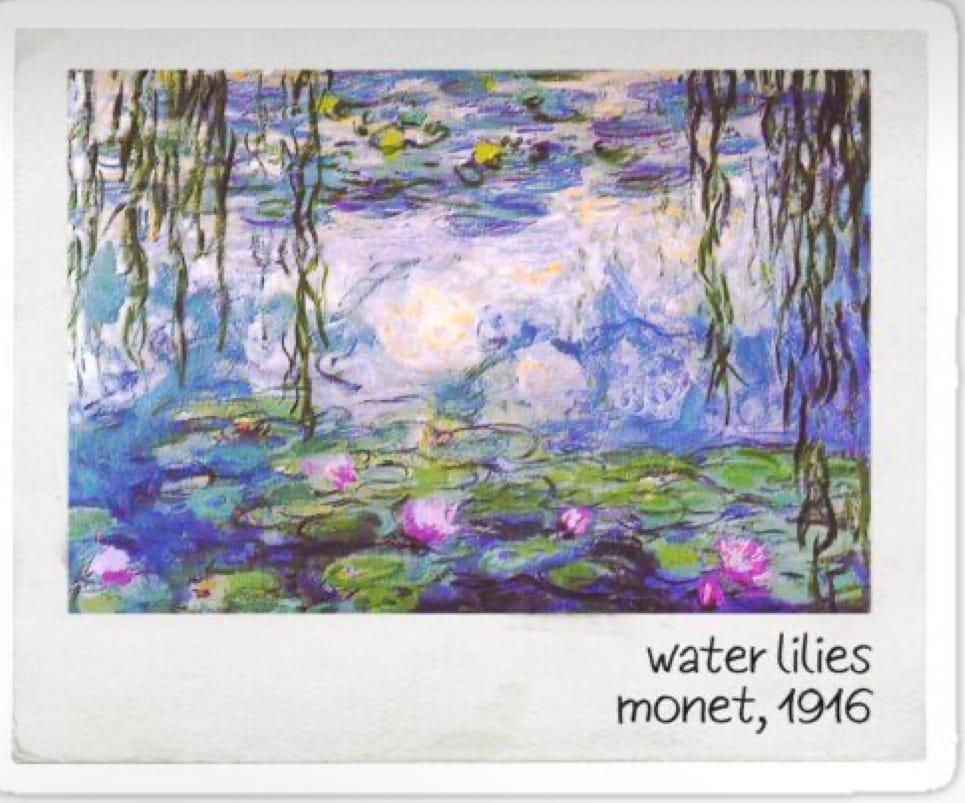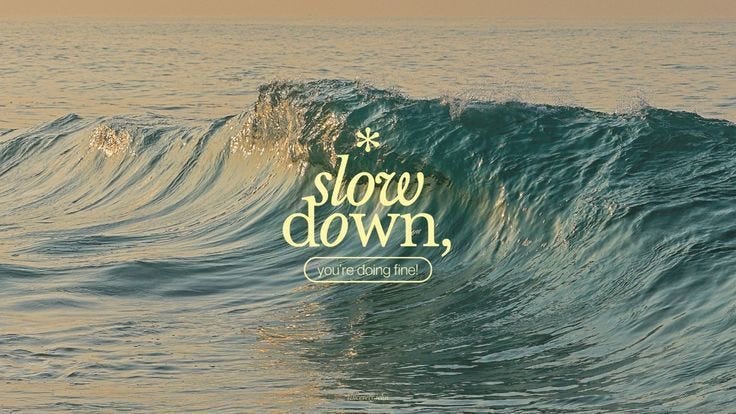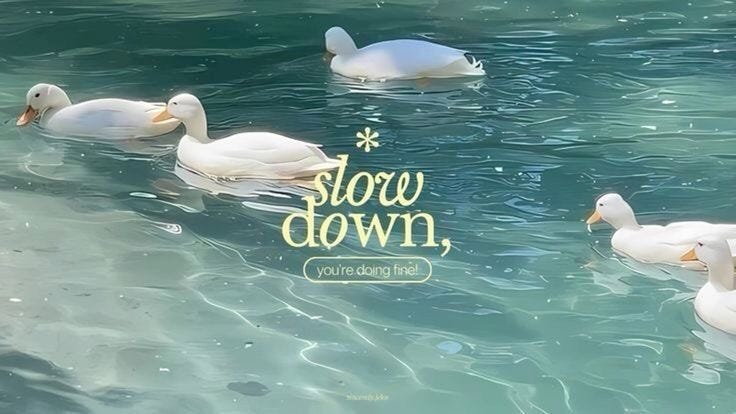I wasn’t made for speed.
And for a long time, I thought that made me weak.
Before we dive into this week’s discussion, I’ve made a small space on Notion for slowing down. You can visit it here and duplicate it if it resonates with you.
In a world obsessed with urgency, slowing down feels like failure.
But the older I get—and the more I listen inward—the more I realize:
🐋 slowing down isn’t quitting. It’s remembering. It’s choosing rhythm over noise, substance over speed.
But it didn’t come easy. From a young age, I had this specific pattern:
every time I started learning something new, I entered a strange fog—beginner’s hell. I couldn’t grasp things quickly. I needed time. Time to understand, to connect dots, to find sparks of insight. Time to question old beliefs. Time to unlearn.
And it was painful.
Because deep down, I’ve always felt that I’ll die not knowing everything I longed to understand. And for someone wired for depth, that used to feel like failure. Like I’d been left behind.
But now, I’ve made peace with that.
Now I know real learning requires humility.
If you’re clinging too tightly to what you already know, there’s no room for what’s trying to come through.
So here’s the truth:
In a world addicted to hustle, slowing down is a radical act.
It’s also a creative one.Part I: The Beginner’s Fog & the Bravery to Unlearn
Slowness often begins in that murky, vulnerable phase where your vision is clear—but your skills haven’t caught up yet.
It’s where self-doubt thrives. Where uncertainty feels louder than progress.
Dan Koe calls this the “Beginner Hell”—the frustrating space between knowing what great looks like and being able to create it.
You have taste. Standards. Intent.
But your outputs still feel off.
So you fumble. You overthink. You doubt yourself.
And your nervous system quietly asks:
“Am I just not good enough?”
But here’s the twist: this gap isn’t proof of inadequacy. It’s the natural tension that precedes mastery.
And to move through it—you don’t just need time.
You need to unlearn.
Beginner Hell isn’t just about lack of skill. It’s about outdated assumptions.
It’s about:
Thinking you need to “get it right” on the first try.
Believing productivity equals worth.
Measuring your pace against someone else’s highlight reel.
These beliefs? They’re invisible weight. And if you don’t drop them, you won’t have the energy—or safety—to grow.
Unlearning is the first real act of progress.
It’s the rewiring of nervous system patterns.
The untangling of inherited pressure.
The decision to stop proving and start building.
That’s why I now treat the fog not as failure, but as compost—messy, slow, rich with possibility.
Because growth isn’t always visible.
Sometimes, it looks like letting go.
Try this:
What belief is shaping how you see your “beginner” self?
Where did that belief come from? Is it still serving you?
What would happen if you gave yourself permission to be in process?
Part II: Slowness as a Tool for Better Decisions
Sometimes we say “yes” too fast.
To jobs that drain us. To relationships that blur our boundaries. To goals we don’t even believe in—but feel pressured to pursue.
Why?
Because urgency masquerades as importance. Because we’re taught to act fast or be left behind. Because we fear being unchosen, unloved, left out.
But what if a pause is the most powerful decision tool we have?
This is how I use the pause now:
Before I say yes, I ask myself:
Does this align with my values and mission?
Do I have the time, energy, and mental space to follow through?
Will this deepen the kind of life I want to create?
If my answer to any of these is less than 90% yes, the answer is no.
But here’s a caution:
You’ve probably heard the advice “If it’s not a hell yes, it’s a no.”
It sounds empowering—but can actually be misleading.
As Michael Thompson explains in this essay, many meaningful decisions don’t feel like a “hell yes” at first.
They often come with fear, ambiguity, or slow-building clarity.
Some of the best opportunities begin with “maybe”—and grow into alignment only after experimentation and learning.
So rather than relying on emotional certainty, I pause and ask thoughtful questions.
Not to be passive—but to be discerning.
Try this:
Before your next yes, take 5 minutes to sit with it.( or as much as you need to detach from it emotionally)
Write your top 3 values. (Here’s a values list PDF by James Clear)
Ask: Am I choosing this from alignment—or fear of missing out, rejection, or approval-seeking?
Part III: Slowing Down to Build a Meaningful Life
I used to think success was about performing constantly. Now I know better.
Real change—real contribution—requires rhythm. Spaciousness. Slowness.
That’s why I began building my own rituals and tools. Not to “optimize” my life, but to reconnect to myself.
Here are some of my favorite ones:
1. Slow mornings:
A spiritual, mental, and physical “win” each morning. For me: prayer, meditation, yoga. It primes me for resilience, creativity, and connection.
2. Emotional first-aid kit:
When overwhelmed, I return to breath, grounding, body scans, and journaling. Not to avoid feelings, but to stay centered through them.
4-4-4-4 box breathing
Scanning and relaxing each muscle group
Journaling my fears so they don’t spin in my head
Returning to nature—touching stone, tree, water
3. Prototyping my ideas & identity:
Instead of overcommitting, I experiment. I test my ideas like a scientist. I build low-stakes versions of projects I care about. I create space to see what sticks, instead of trying to predict the future.
4. Saying no to what’s not aligned:
Not out of fear. Out of clarity. And when I say no, it’s because I’ve said a deeper yes to something that matters more.
Try one of th:
Build a 3-win morning (spiritual, mental, physical).
Write your own definition of “enough.”
What’s one thing you can prototype instead of perfect?
Final Thought:
Slow doesn’t mean small.
Slow means intentional.
Slow means true to your pace.
And in a culture of speed, staying true to your pace might be the bravest thing you ever do.
Reflection Prompt:
What’s one area of your life where you could slow down—without guilt?
I’ve made a small space in Notion for slowing down. You can visit it here and duplicate it if it resonates with you.
References & Sources:
Burnout, Emily Nagoski
In Praise of Slow, Carl Honoré
Adam Grant on Unlearning
Dan Koe on beginner’s hell
Michael Thompson – Hell Yes Fallacy Article
James Clear – Core Values PDF








What a helpful and much needed post in our crazy times. Thank you!
Ps. The visuals are beautiful 😍
a beautiful reminder to slow myself down. thank you